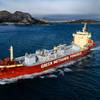NCA Enters Long Term Contract with FORCE
The Norwegian Coastal Administration (NCA) has entered into a long term contract with FORCE Technology for simulator based training of 350 Pilots and VTS operators focussing on resource management and teamwork between pilots and VTS operators.
The contract was secured after the NCA had issued an international tender for the training. ’We chose FORCE Technology because of their high competence level and their experience gained through many years of conducting training with a strong focus on Human Factors and Pedagogical methods within simulator based training’, explains Jon Leon Ervik, Head of Centre for Pilotage and Vessel Traffic Services in Norway.Another decisive factor in the choice of FORCE Technology as training provider was the market leading simulator facilities offered in the DANSIM training center in Lyngby near Copenhagen, Denmark. Peter K. Sørensen, Head of Department, Training, Ports and Human Factors says, ‘This is a significant contract for the maritime training department of FORCE Technology. FORCE Technology has been conducting international Pilot training and provided input to design of VTS operations for many years and we are very happy that the NCA has chosen our company as training provider. We see this as the result of many years of focused effort on the development of efficient training tools ’ High degree of training transferThe contract is five years of length. In this period FORCE Technology will conduct training of approximately 350 Norwegian Pilots and VTS operators. The training will take place at FORCE Technologys advanced simulator training center in Lyngby, Denmark.
FORCE Technology provides very knowledgeable and experienced simulator instructors and with the five year contract, FORCE Technology will add further distance to the other players on the simulator training market. But besides this, Peter K. Sørensen highlights the NCA’s choice of experience and quality when it comes to training. Peter K. Sørensen explains, ‘Together with the simulator instructors’ competences, the pedagogical approach is the most important non-technical factor in achieving a high degree of training transfer. It is easy to be tempted by the low cost simulator training courses offered from some parts of the world. But we have proved that the degree of training transfer is proportional with the quality of the training including the quality of the instructors, the pedagogical tools and the quality of the simulator facilities. Therefore, we are happy that our Norwegian neighbours are committed to providing the best possible training for their Pilots and VTS operators.’
On the technical side, the accuracy of the ship models and the simulator set-up is the most important factor. FORCE Technology uses the in-house developed software, SimFlex, which is based on the most accurate mathematical model, the DEN-Mark1 model, within maritime simulation. The mathematical core of the software is based on more than 50 years of hydro- and aerodynamic knowledge and supported by a unique and unmatched combination of knowledge withinsimulator development and use. Internationally recognised training FORCE Technology have been engaged in development of simulator-based training methods for many years, and our methods are now internationally recognised and used in other domains using simulators, e.g. air traffic controllers and power station operators. The methods has a.o. resulted in a reduction in the failure rate for air traffic controllers from 50% to near zero.








